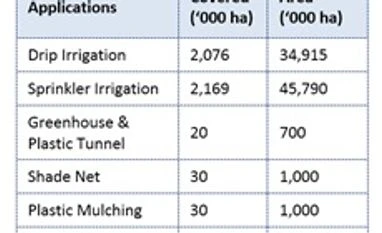Sustainability of agriculture is under stress due to depleting natural resources and increasing carbon footprint. There is a need for the government to mandate farmers to use micro irrigation and plasticulture techniques for all the water guzzling crops. This has the potential to nudge India from water stressed zone by improving per capita availability to more than 1,750 cubic meters (m3) from current 1,588 m3.
Back to basics
The recent GHI (Global Hunger Index) rating of 2015 puts India at 63rd position among the 76 developing nations covered. India supports nearly 16 percent of world’s population with 2.4 percent land and 4 percent water resource. Current per capita availability of water is at 1,545 m3 and is to go down to 1,401 m3 by 2025.
Agriculture in India is highly dependent on monsoon and water available for irrigation is around 78 percent. It is expected to come down to approximately 72 percent by 2025. Ground water table has fallen more than 4 meters during last two decades and in some high agricultural productivity, it is falling at rate on one meter per annum. As per estimates by 2025 about a third of India would be under absolute water scarce condition.
ALSO READ: Plastics can help to optimise usage of water in agriculture
ALSO READ: Plastics can help to optimise usage of water in agriculture
Table 1 (top) and Table 2
Also Read
Plasticulture: A boon to agriculture
Plasticulture, which implies using plastics in agricultural across the production and post-harvest value chain, could be an answer to this rallying cry. It improves farm productivity, optimises the input resources and reduces the overall farming cost.
Based on the water consumption in agriculture, as per Tata Strategic Management Group (TSMG) analysis, the water savings from plasticulture adoption could improve the per capita availability of water by about 160 m3 from 1,545 m3 to approximately 1,705 m3, thereby significantly reducing water stress in the country (refer Table 2).
ALSO READ: Skipper opens PVC pipes plant in Telengana
ALSO READ: Skipper opens PVC pipes plant in Telengana
Plasticulture techniques are well established across the world. In India there has been significant progress in the adoption of plasticulture techniques in the last decade. However, the penetration levels are still low (refer Table 3).
As per the 12th five year plan by the Government of India, 100.8 lakh hectares of land is expected to adopt micro-irrigation methods with drip irrigation covering about 48 lakh hectares and sprinkler irrigation covering approximately 53 lakh hectares.
Table 3
ALSO READ: Finolex plans incremental expansion to meet demand for PVC pipes
Relevant government interventions could further speed up the adoption of plasticulture in India. For example, providing an encouraging environment to the industry for investments in R&D which brings down the capital cost, supports farmers with initial subsidies as per the local conditions, improves timely disbursements of subsidies to the supplier and helps farmers with easy financing options would positively influence the industry structure.
Towards sustainable agriculture
Building awareness about the relevance and benefits of the plasticulture techniques would help farmers and will drive adoption rate. Agrochemicals, agri-services and plastics manufacturing companies could jointly work together to build awareness and to spread their costs for such initiatives. This could be accomplished through demonstrations (both physical and through digital mediums), conducting pilot runs and showcasing performance improvements at panchayats, farmer associations etc.
It is clear that adoption of plasticulture is the need of the hour for India to remain self-sufficient in food & water security. We are at the cusp of changing paradigm in agriculture and it is an opportunity we have to tame efficiently and swiftly to build a sustainable agriculture in India.
________________________________________________________________________________________________
________________________________________________________________________________________________
Manish Panchal is the senior practice head (chemicals & energy) at Tata Strategic Management Group (TSMG)
Charu Kapoor is the principal (chemicals practice) at TSMG
Abhishek Kumar is the associate consultant at TSMG
)